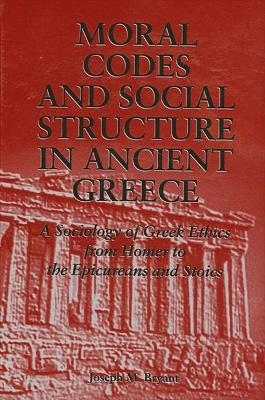
Moral Codes and Social Structure in Ancient Greece
State University of New York Press (Verlag)
978-0-7914-3042-2 (ISBN)
Joseph M. Bryant is Associate Professor of Sociology at the University of New Brunswick, Canada.
Acknowledgements
Preface: The Sociology of Knowledge and Historical Sociology
Introduction: The Polis and the "Spirit" of Hellenism
1. The End of the Bronze Age
2. Dark Age Greece
I. Social Structure: The Oikos and the Community
II. Norms and Values: The Ethos of the Warrior-Aristocracy
3. Archaic Greece
I. Social Structure: The Emergence of Polis Society
i. Social Change in the Early Archaic Age
ii. Hoplites and Tyrants in an Age of Transition
iii. Sparta's Perfection of the Warriors' Guild
iv. Toward Democracy in Athens
II. Norms and Values: The Articulation of the Polis-Citizen Bond
i. Aristocratic Supremacy in the Early Archaic Age: Hereditary Virtue and the Agonal Ideal
ii. The Dêmos in Dependency: Peasant Values and the Cry for Social Justice
iii. The Rise of Hoplite Heroes and Codification of the Polis Ideal
iv. Troubled Aristocrats, Confident Commoners, and the Contest for Status Honor and Self-Affirmation
v. From Myth to Science, and the Occult: The Quest for Knowledge and Salvation
4. Classical Greece
I. Slavery and the Material Foundations of Classical Civilization
II. The Persian Challenge: Military Triumph and Cultural Affirmation
III. The Classical Polis: Institutions and Normative Ideals
IV. The Sophists and Sokrates: Critical Rationalism and the Revaluation of Conventional Morality
V. Democratic Imperialism and the Expansion of Athenian Power
VI. The Peloponnesian War, Civic Factionalism, and the Rupturing of Polis Communalism
5. Fourth-Century Greece and the Decline of the Polis
I. Hegemonial Rivalries, Class Struggle, and the Deepening Crisis of Social Disorganization
II. Mercenaries, Military Monarchs, and the Erosion of Citizen Politics
III. Plato and the Dilemmas of Politics and Reason: The Polis as Philosophical Project
IV. The Minor Sokratics and the Onset of Normative Individualism
V. The Macedonian Conquest and the Suppression of Polis Autonomy
VI. Aristotle's Social Philosophy and the Sociology of Power
VII. Diogenes and Cynic Antinomianism
6. The Hellenistic Age
I. Alexander and the Graeco-Macedonian Conquest of the East
II. Wars of the Successors and the Consolidation of Imperial Patrimonialism
III. Ethics in a New Key: The Retreat from Polis-Citizen Ideals and the Interiorization of Moral Value
i. Epicureanism: Pleasure and Tranquillity in the Garden
ii. Stoicism: The Ethos of "Self-Hardening"
iii. Syncretism Triumphant: External Unfreedom and the Quest for Inner Plenitude and Immunity
Epilogue: On Reductionism, Relativism, and the Sociology of Morals and Philosophy
Glossary of Greek Terms
Notes
Selected Bibliography
Index
| Erscheint lt. Verlag | 3.7.1996 |
|---|---|
| Reihe/Serie | SUNY series in the Sociology of Culture |
| Zusatzinfo | Total Illustrations: 0 |
| Verlagsort | Albany, NY |
| Sprache | englisch |
| Maße | 152 x 229 mm |
| Gewicht | 816 g |
| Themenwelt | Geschichte ► Allgemeine Geschichte ► Vor- und Frühgeschichte |
| Geisteswissenschaften ► Geschichte ► Regional- / Ländergeschichte | |
| Geschichte ► Teilgebiete der Geschichte ► Kulturgeschichte | |
| Geschichte ► Teilgebiete der Geschichte ► Sozialgeschichte | |
| Sozialwissenschaften ► Ethnologie | |
| Sozialwissenschaften ► Soziologie | |
| ISBN-10 | 0-7914-3042-1 / 0791430421 |
| ISBN-13 | 978-0-7914-3042-2 / 9780791430422 |
| Zustand | Neuware |
| Haben Sie eine Frage zum Produkt? |
aus dem Bereich


